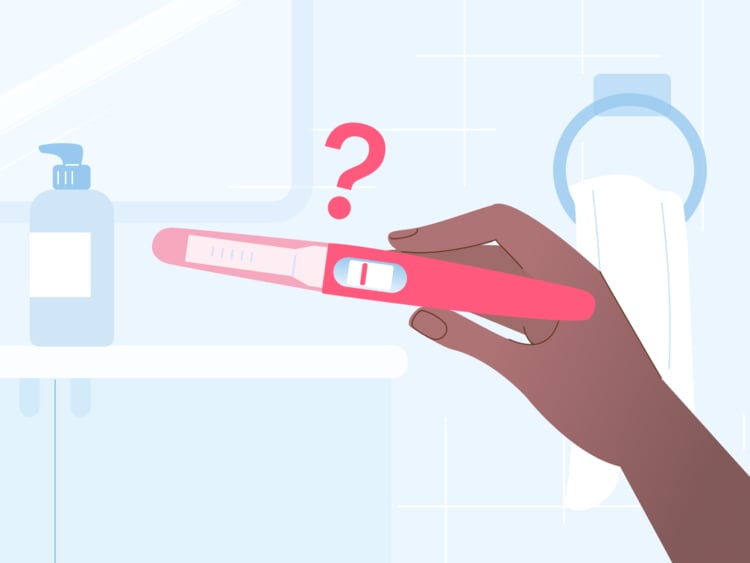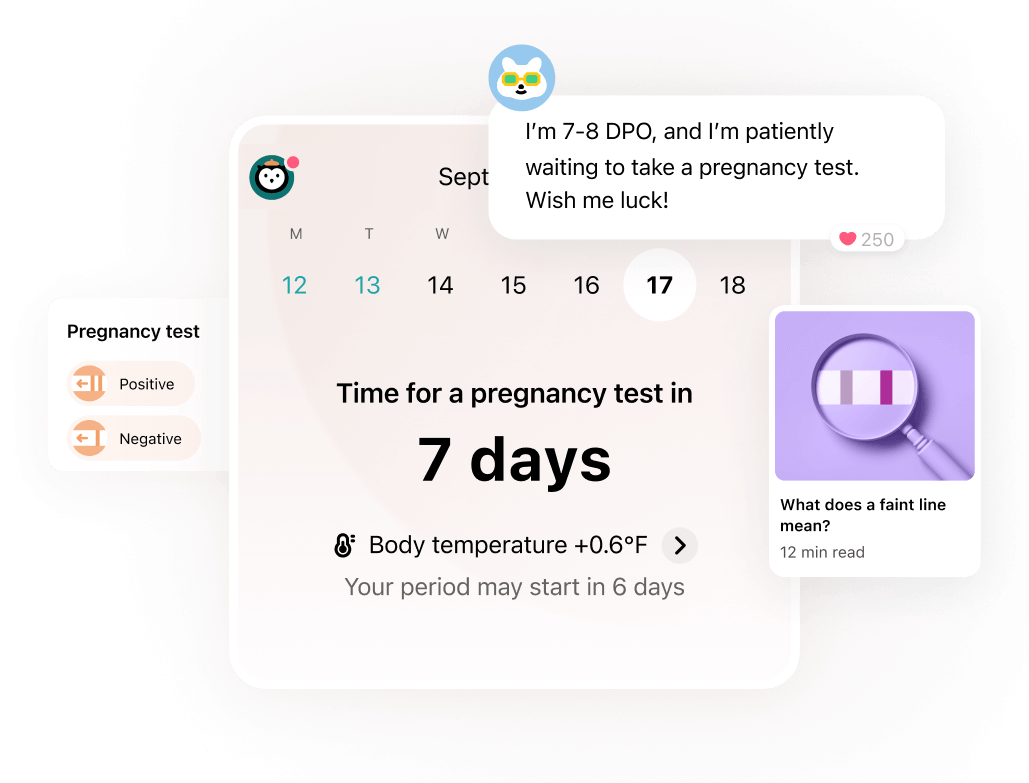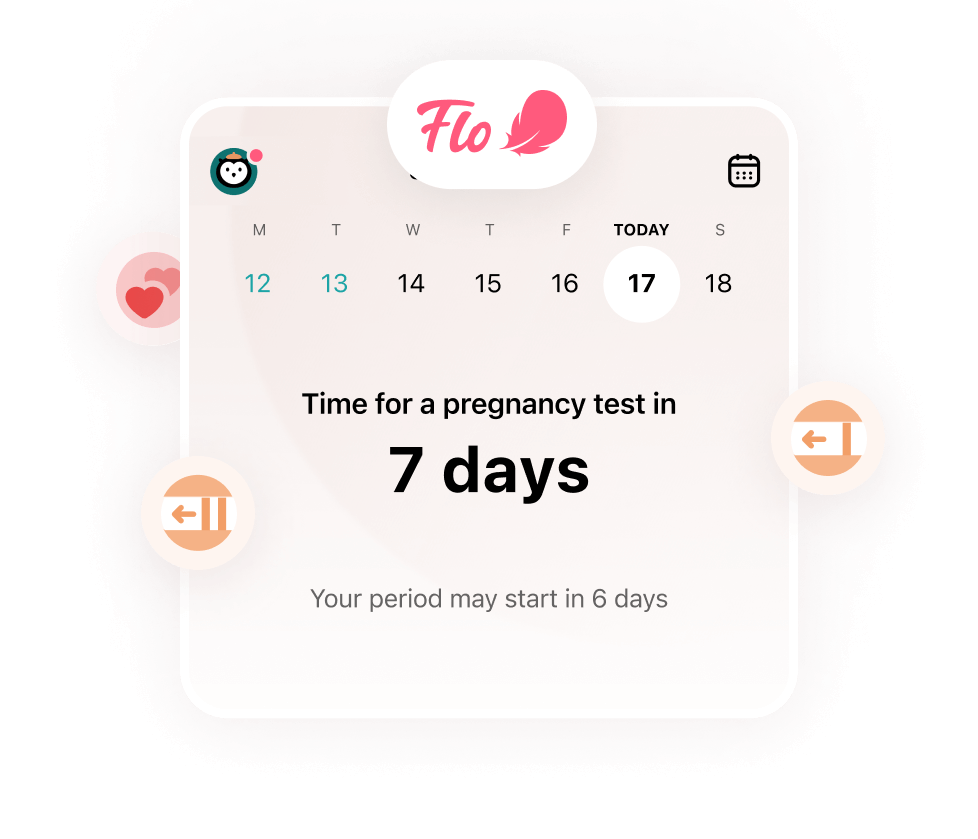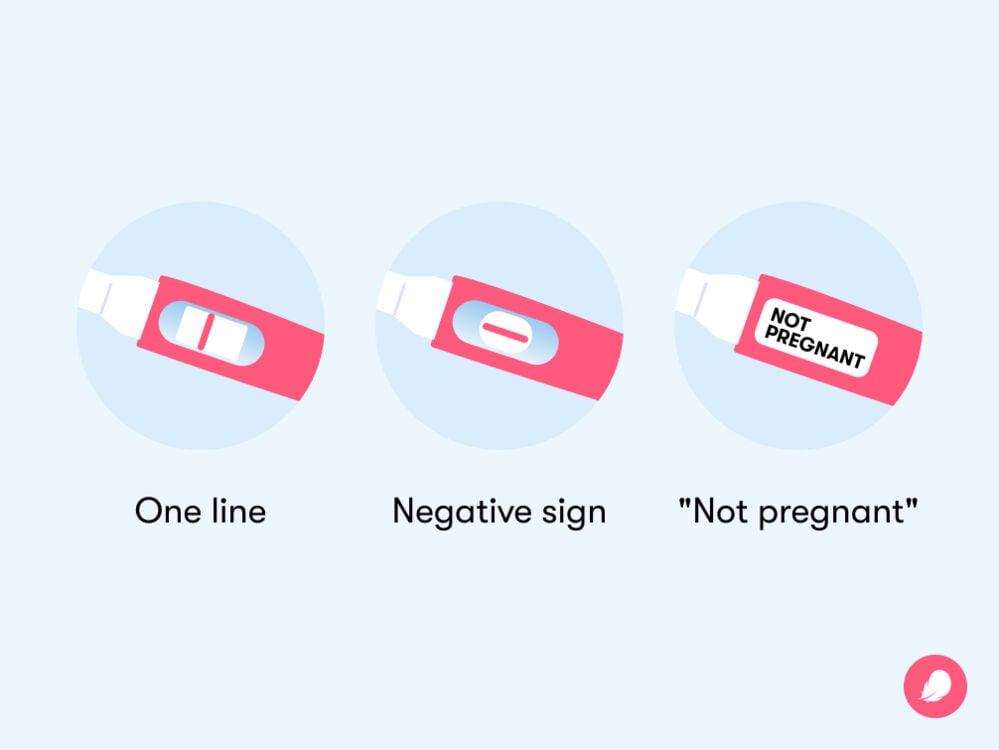There’s no denying that getting a negative pregnancy test can be confusing, especially if your period is late. Here’s how to tell the difference between a negative pregnancy test and a false-negative result and what to do next.
-
Tracking cycle
-
Getting pregnant
-
Pregnancy
-
Help Center
-
Flo for Partners
-
Anonymous Mode
-
Flo app reviews
-
Flo Premium New
-
Secret Chats New
-
Symptom Checker New
-
Your cycle
-
Health 360°
-
Getting pregnant
-
Pregnancy
-
Being a mom
-
LGBTQ+
-
Quizzes
-
Ovulation calculator
-
hCG calculator
-
Pregnancy test calculator
-
Menstrual cycle calculator
-
Period calculator
-
Implantation calculator
-
Pregnancy weeks to months calculator
-
Pregnancy due date calculator
-
IVF and FET due date calculator
-
Due date calculator by ultrasound
-
Medical Affairs
-
Science & Research
-
Pass It On Project New
-
Privacy Portal
-
Press Center
-
Flo Accuracy
-
Careers
-
Contact Us
Negative and false-negative pregnancy tests: Everything you need to know


Every piece of content at Flo Health adheres to the highest editorial standards for language, style, and medical accuracy. To learn what we do to deliver the best health and lifestyle insights to you, check out our content review principles.
Receiving a negative pregnancy test result when you are trying for a baby can be difficult, but having an answer you know you can trust is crucial. You might have heard of false positives in the past — getting a positive pregnancy test result when you’re not pregnant. But what about a false-negative test result?

 Over
7.8M
ratings averaging
4.8/5
*
Over
7.8M
ratings averaging
4.8/5
*
Make sense of pregnancy testing with the Flo app
- Know when it’s the right time to take a test.
- Log results of previous pregnancy tests.
- Chat with others who are trying.
 Over
7.8M
ratings averaging
4.8/5
*
Over
7.8M
ratings averaging
4.8/5
*

Hoping for a positive pregnancy test?
The Flo app can help you on your path to parenthood.

 Over
7.8M
ratings averaging
4.8/5
*
Over
7.8M
ratings averaging
4.8/5
*
Make sense of pregnancy testing with the Flo app
- Know when it’s the right time to take a test.
- Log results of previous pregnancy tests.
- Chat with others who are trying.
To help explain the science behind both negative and false-negative pregnancy tests and the best time to do another test if you’re doubting your previous result, we spoke to Dr. Nazaneen Homaifar, obstetrician and gynecologist, Inova Health System, Washington, DC, US. Read on for everything you need to know.
Take a quiz
Find out what you can do with our Health Assistant
How home pregnancy tests work
Home pregnancy tests are pretty clever. They work by checking for a hormone called human chorionic gonadotropin (hCG), which your body only starts to make when you’re pregnant. The volume of hCG in your body (specifically, in your blood and urine) increases rapidly during early pregnancy. To learn more about hCG you can use Flo’s hCG calculator.
Most home pregnancy tests are urine tests. These involve holding a testing stick in your stream of pee or dipping it in a urine sample you’ve collected to test for the presence of hCG. You usually have to wait at least two minutes for the result and they’ll usually show up as one or two lines, a plus or minus sign, or words such as “pregnant” or “not pregnant.” However, every test is different so be sure to read the instructions carefully so you know what to expect. And remember: never use a test that has gone past its expiry date.

How accurate are home pregnancy tests?
If you follow the instructions on your home pregnancy test correctly, then most of them claim to be around 99% effective. However, this might not always be the case, and timing is key to getting the most accurate results — as we’ll discover later on in this article.
Should you repeat a test if you get a negative result?
If you have a feeling you might be pregnant but have had a negative test result and want to test again to be absolutely sure, then that’s completely normal. However, as hard as it can be to wait, you’ll likely get a more accurate result if you don’t take another test immediately.
“If pregnancy is suspected despite a negative test, the test should be repeated in one week,” says Dr. Nazaneen Homaifar. You could also speak to your doctor, who might recommend that you have a blood test to determine whether you’re pregnant. These are more sensitive to pregnancy than urine tests, as they can detect lower levels of hCG, meaning they’re quicker to provide an accurate result.
Is it possible to be pregnant and get a negative pregnancy test result?
It is possible to be pregnant and get a negative pregnancy test result. It can happen for a few different reasons. Let’s take a closer look at some of them below.
Causes of false-negative pregnancy tests
Incorrect use
If you don’t use the pregnancy test correctly (for example, by checking the results too soon), it may not be accurate. “Incorrect use of any test can result in errors in results,” adds Dr. Homaifar. To prevent this from happening, always read and follow the test instructions carefully. You could also set a timer to stop you from looking at the results too early, as tempting as this may be!
Faulty test
In some instances, the home pregnancy test itself might be faulty. “If a test is expired or faulty, the assay [testing mechanism] that allows it to detect the correct pregnancy hormone markers may not work properly,” explains Dr. Homaifar. You could try taking another pregnancy test to see if you get a different result.
Testing too early
Timing is everything when it comes to taking a home pregnancy test. For the most accurate results, take your test the day after a missed period. “If you test too early, your urine pregnancy hormone level may be too low to detect on the home kit, and it may show up as negative,” explains Dr. Homaifar. If you’re unsure whether it’s time to take a test, our handy pregnancy test calculator can help.
Miscalculated menstrual cycle
In order to take a test after the first day of a missed period, you need to be pretty familiar with the length of your menstrual cycle. But this can be easy to miscalculate, especially if you’re one of the 14% to 25% of women whose menstrual cycles are irregular. “If your ovulation varies by a few days because your cycle varies in length, it can throw off when the hCG is first detected in the urine,” explains Dr. Homaifar. This means a pregnancy test might come back negative, even if you are pregnant at this time.
Diluted hCG levels
Especially in the first few days after implantation, when your body’s levels of hCG are low and still rising, the amount of water in your urine can impact the result of your pregnancy test. “If urine is diluted, there might not be enough pregnancy hormone in it to be detected,” explains Dr. Homaifar.
If you think you’re ready to take a test, you’re likely to get the most accurate results when you wake up. “Try testing first thing in the morning when urine is concentrated, or avoid drinking large amounts of water before testing,” says Dr. Homaifar. If you can’t test first thing in the morning, or you don’t want to wait until the next day to take a test (the impatience is real!), then experts recommend waiting until it’s been at least three hours since your last pee, if possible.
Too much hCG in the urine
Confusingly, when levels of hCG are too high, they can also interfere with pregnancy test results. This is why, interestingly, being pregnant with twins can sometimes cause a false-negative pregnancy test.
Having twins, triplets, or more can cause the body to produce higher levels of hCG. This could be the reason why some people might find themselves three months pregnant with a negative pregnancy test (yes, really!).
“Very high concentrations of hCG can cause a ‘hook effect,’” says Dr. Homaifar. This essentially means that the test can become saturated with hCG, leading to an inaccurate negative result.
Can you still be pregnant with two negative tests?
It is still possible to be pregnant if you’ve had two negative tests. It all depends on a variety of factors. Before you take a test, think about:
- The timing: You need to give your body long enough to produce enough hCG to be detected by a test. For the best chance at an accurate result, wait until the first day of a missed period. Understanding your cycle using an app like Flo can help you do this.
- Your test: Have you read the pamphlet, and is your test unexpired? Pregnancy tests may seem pretty straightforward, but they can expire, so make sure yours is good to use before you take it.
- How much water you’ve drunk: You don’t need to drink lots of water before you take a pregnancy test. In fact, it can dilute the hCG in your urine.
If a pregnancy test is negative today, can it be positive tomorrow?
While pregnancy tests can be costly, you might choose to test over a couple of days if you suspect that you could be pregnant. In very early pregnancy, when your hCG levels are starting to rise, it is possible to get a negative pregnancy test on one day and a positive test the next. This is because your hCG levels may have just risen high enough to be detected. You can also track any early signs or symptoms using an app like Flo.
Pregnancy symptoms despite a negative test
Some early signs of pregnancy include cramping, nausea, mood changes, breast pain or tenderness, and fatigue or feeling more tired than usual. Frustratingly, due to hormonal changes that happen in early pregnancy and just before your period, it can be tricky to figure out whether symptoms are premenstrual syndrome (PMS) or a sign of conception.
If you’ve had a negative pregnancy test result but still feel these symptoms and think you could be pregnant, then reach out to your doctor.
Why you might have a late or missed period if you have a negative pregnancy test
Pregnancy isn’t the only reason why you might have had a no-show period. As Dr. Homaifar explains, the following can also cause menstrual irregularities:
- Stress
- Rapid fluctuations in body weight (either loss or gain)
- Eating disorders
- Certain medications
- Medical conditions: “There are also some medical conditions that can cause irregularities in ovulation, which can manifest as a late or missed period, including polycystic ovary syndrome, pituitary tumors, issues with the thyroid or even adrenal glands,” explains Dr. Homaifar.
These factors and conditions might sound scary, but remember that there are many different reasons for a late or missed period. In fact, it’s perfectly normal to experience variations and fluctuations in your cycle throughout your lifetime, so a late period isn’t necessarily a cause for concern. As always, if you have any questions or concerns, be sure to reach out to your doctor. They can check you over and run some tests and hopefully give you the reassurance that you need.
Could it be spotting instead of a period?
Things can become even more confusing if you think you’re experiencing spotting — which can be an early sign of pregnancy — rather than your period.
Spotting is generally described as light bleeding, meaning you don’t need to use a pad or tampon while you have it. It’s usually light brown or pink and not accompanied by cramping or blood clots. But how can you tell the difference between that and your regular period? “Sometimes it’s really hard,” says Dr. Homaifar. “For most people, their first full day of a menstrual cycle has a steady flow (whether light, moderate, or heavy) rather than spotting.” You’ll hopefully be able to judge whether the bleeding you’re experiencing is lighter than your normal period, but always reach out to your doctor if you’re unsure or concerned.
Could a negative pregnancy test result be wrong?
You may be wondering whether it’s possible to get a negative pregnancy test even when you are actually pregnant. The short answer is yes, there are circumstances when a negative result could be wrong.
How does it feel to get a false-negative pregnancy test?
So what’s it like to experience a false-negative pregnancy test? Amy Buckler-Smith, 33, from London, had been trying for a baby for around three months when she got a negative pregnancy test right before going on holiday. “You can’t help but worry,” says Amy.
Amy tried to stay positive and focused on having a good trip to Dubai with her friends. But when she got home around 10 days later, she felt unusually tired and nauseous. “I felt a little bit woozy and sick but thought I couldn’t be pregnant,” says Amy, who is a pregnancy and postnatal personal trainer and the founder of No Sweat Mama. “I came across a pregnancy test while cleaning and thought, I should just do it.”
The test came back positive. Amy was delighted but added that “It was a very big shock.” She still doesn’t know why her first test was a false negative but wonders if she checked the results too soon. “According to my dates, the test should have shown positive,” she says.
Amy did another test later that day to double-check, which was also positive. Then, “the symptoms came on thick and fast,” so there was no room for doubt. “I think the most important thing in pregnancy is listening to your body,” says Amy. “Whether it’s exercising or drinking water, eating enough, or taking a pregnancy test, just listen to your body. And make sure you know the symptoms of pregnancy!”
What to do if you think you are pregnant but the test is negative
It’s important to know when to see a doctor if you have a late period and a negative pregnancy test. “If you’re having pregnancy symptoms but have had two negative test results (tested a week apart), then you should go see a doctor,” advises Dr. Homaifar. “Early pregnancy symptoms also mimic premenstrual symptoms at times. [Your doctor] can talk to you about your symptoms, determine if you need to do a blood test or imaging, and rule out other potential reasons why you might be experiencing them.”
The takeaway: Negative and false-negative pregnancy tests
It can be really disheartening to get a negative pregnancy test result followed by your period, but try not to give up hope. Keep in mind the fact that 85% of couples under 35 will conceive within a year of having regular, unprotected sex, and try to focus on trying to conceive in your next cycle.
If you’ve got a negative pregnancy test but no period, you should ideally wait for one week before taking another test, as hard as this can be. While there are a number of reasons why this might happen, it is possible to get a negative pregnancy test but be pregnant. Like Amy, you may have accidentally taken the test incorrectly or miscalculated your cycle. Don’t forget you can use an app like Flo to help you keep track of your periods and hopefully limit the possibility of this happening.
Above all, remember to listen to your body and be mindful of pregnancy symptoms. If in doubt — especially if you’ve got two negative results one week apart — then always reach out to your doctor for advice.


Hey, I'm Anique
I started using Flo app to track my period and ovulation because we wanted to have a baby.


The Flo app helped me learn about my body and spot ovulation signs during our conception journey.


I vividly
remember the day
that we switched
Flo into
Pregnancy Mode — it was
such a special
moment.
Real stories, real results
Learn how the Flo app became an amazing cheerleader for us on our conception journey.
References
Eskandar, Mamdoh A., et al. “Early Maternal Serum β-Human Chorionic Gonadotropin Measurements after ICSI in the Prediction of Long-Term Pregnancy Outcomes: A Retrospective Cohort Analysis.” Journal of Clinical Medicine Research, vol. 3, no. 1, Feb. 2011, pp. 30–35, http://dx.doi.org/10.4021/jocmr477e.
“Home Pregnancy Tests: Can You Trust the Results?” Mayo Clinic, 23 Dec. 2022, www.mayoclinic.org/healthy-lifestyle/getting-pregnant/in-depth/home-pregnancy-tests/art-20047940.
“Human Chorionic Gonadotropin.” Cleveland Clinic, my.clevelandclinic.org/health/articles/22489-human-chorionic-gonadotropin. Accessed 14 Apr. 2024.
“Irregular Periods.” Cleveland Clinic,my.clevelandclinic.org/health/diseases/14633-abnormal-menstruation-periods. Accessed 14 Apr. 2025.
“Expecting Twins or Triplets.” Cleveland Clinic, my.clevelandclinic.org/health/articles/9710-expecting-twins-or-triplets. Accessed 14 Apr. 2025.
“Pregnancy Tests.” Cleveland Clinic, my.clevelandclinic.org/health/diagnostics/9703-pregnancy-tests. Accessed 14 Apr. 2025.
“Symptoms of Pregnancy: What Happens First.” Mayo Clinic, 13 Mar. 2024, www.mayoclinic.org/healthy-lifestyle/getting-pregnant/in-depth/symptoms-of-pregnancy/art-20043853. Accessed 11 Apr. 2025.
“Vaginal Bleeding in Pregnancy.” NHS, www.nhs.uk/pregnancy/related-conditions/common-symptoms/vaginal-bleeding/. Accessed 14 Apr. 2025.
History of updates
Current version (17 April 2025)
Published (08 January 2020)
In this article

Get your personal guide to fertility
-
Learn how to read your body's ovulation signals
-
Find daily conception tips from our experts
-
Chat with others who are trying to get pregnant




